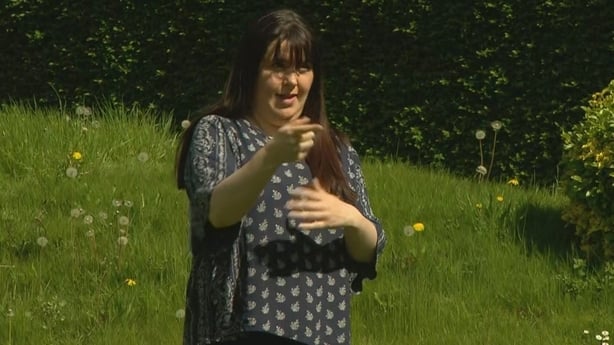Over the past five weeks a team of Irish Sign Language interpreters have become familiar faces at the daily briefings on Covid-19.
Working under intense pressure, they interpret the latest information on the virus to make it accessible for the 5,000 deaf people in Ireland.
A further 40,000 people are members of the deaf community who use the language on a daily basis.
Michael Feeney is one of six interpreters rotating the daily briefings at the Department of Health.
"It's very high pressured, very intense, very fast-paced and the logistical questions that are asked and responded to can just be very difficult," he said.
"So we do our best to interpret accurately, to make sure the information is getting across in the right way, that it's accessible to as many deaf people watching as possible."
Michael has been working as a sign language interpreter for seven years after completing a four-year degree in deaf studies at Trinity College Dublin.
To reduce fatigue during these, often very lengthy, briefings they work in pairs taking it in turns to interpret, swapping every 15/20 minutes.
Irish Sign language is unique with its own grammatical structure but it's not just a language of the hands.
Susan Foley Cave, director of Bridge Interpreting, said: "A certain amount of information is on the hands but so much more has to be taken into account when you're signing, when you're using the language, upper body movement, eye blinks, eye gaze, mouthing patterns."
Each country has its own sign language.
For example, Ms Foley Cave said: "In Northern Ireland they actually have our sign language and British sign language which is why you see two interpreters side by side in those briefings."
"The language is nothing to do with English and nothing to do with Gaeilge. It's a stand-alone language in its own right, it has its own grammatical structure."
Lianne Quigley, chair of the Irish Deaf Society, said: "It's hugely important to have an ISL interpreter [at the briefing] to have accessibility to all the information.

She said to have "access to information in such an emergency situation is extremely important".
But Ms Quigley said some of the Government press briefings have not been fully interpreted.
She said the Irish Deaf Society has been working with the HSE and the Department of Health making videos to post on its website to ensure accessibility to the information for all deaf people.
Michael Feeney expects to be interpreting briefings at the Department of Health for weeks to come, saying it is a privilege to be doing a job that is so essential for the deaf community.






